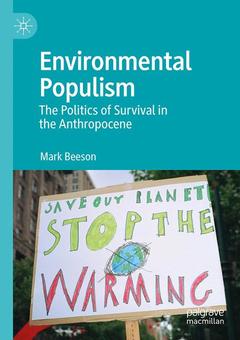Description
Environmental Populism, 1st ed. 2019
The Politics of Survival in the Anthropocene
Author: Beeson Mark
Language: English
Subjects for Environmental Populism:
Keywords
The Rise of Populism; Environmental Refugees and their Impact; Environmental Policy Development; The Security Implications of Global Warming; International Cooperation and Conflict; Climate Change and Populism; State of Global Environment; Securitization of Environmental Issues; Social Movements; climate change
Support: Print on demand
Description
/li>Contents
/li>Biography
/li>Comment
/li>
Considers mutually constitutive interaction between populism and climate change
Develops original, plausible comparative scenarios
Written in an accessible manner that appeals to both scholarly and wider audience




